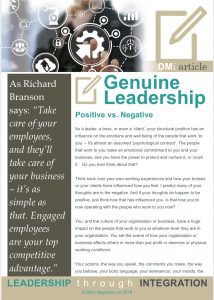Genuine Leadership: Positive vs. Negative
As a leader, a boss, or even a ‘client’, your structural position has an influence on the emotions and well being of the people that work ‘to you’ – it’s almost an assumed ‘psychological contract’. The people that work to you make an emotional commitment to you and your business, and you have the power to protect and nurture it, or crush it. Do you ever think about that?
Think back over your own working experiences and how your bosses or your clients have influenced how you feel. I predict many of your thoughts are in the negative. And if your thoughts do happen to be positive, just think how that has influenced you. Is that how you’re now operating with the people who work to you now?
You, and the culture of your organisation or business, have a huge impact on the people that work to you at whatever level they are in your organisation. You set the scene of how your organisation or business affects others in more than just profit or reserves or physical working conditions.
Your actions, the way you speak, the comments you make, the way you behave, your body language, your demeanour, your moods, the feedback you give – all these have a magnified impact on the people that work to you. Regardless of whether the impact is good or bad – as a leader the impact, the influence you have, is greater than anyone else in the company.
Unfortunately, most people react more to negative influences than positive ones. Negative ones mean far more than positive ones. As far as figures go, studies suggest a ratio of up to 1:7 – seven positive things need to be heard before it has the same impact as a negative thing. For my message, I’ll settle for a ratio from a study by the Harvard Business School of 5:1. Research has also shown that we process good and bad things in different parts of the brain and that we have to ‘think’ through bad and negative things – we have to process them differently to ‘good’ things so we can plan our ‘fight or flight’.
And it’s not just about ‘what’ you say. With 93% of communication being ‘non-verbal’ your influence is communicated to people in many different ways.
The people who work to you come in many different forms and at many different levels. Every single person is different – their skills, their values, their experience, their history, their personality – a myriad of personality traits and characteristics are to be found in the people that work to you.
I’m not saying that you have to take responsibility for other people’s emotions. I’m not asking you to meet everyone’s aspirations. I’m just asking that you understand, respect and are fully aware of the impact and influence you have. Do as much as you can to take it into account and whatever you do, don’t disregard it.
Most people’s work occupies their mind during their waking life in the working week for the majority of the time. Most people ‘take it home’ with them – it affects their evenings and weekends, their family and friends. As a leader, a boss, a manager, you touch many people’s lives, their well-being, and their mental health.
Have a think about how many KPIs you have in your business. Where are you looking at team work, collaboration, initiative, commitment, beliefs, potential, regard, respect, mental health and well-being in the people that work to you? Have a think about the meetings you have with individuals and teams – the infamous review, appraisal and supervision meetings. Where do you take into account the 5:1 ratio? Even the words you use for these meetings, so they maximize positivity? Could you introduce new meeting titles, descriptions and actions that promote security, recognition, support, learning, growth and well-being?
A member of your team, workforce, a supplier or a distributor who comes to you with energy, commitment, enthusiasm, belief, experience, ability and an understanding of your vision is a huge asset to your business. But you hold that asset in your hands. You are a huge ‘feeder’ of that person’s needs and expectations. If you don’t reflect, safeguard or recognise these intangible things your business will soon be worse off by not experiencing the results of what that person did or could have done for you. At the same time you can rest assured that the person will have struggled with the impact of your disregard and disrespect and relived it time and time and time again. I suspect it will stay with them for a long time (as your experiences of previous bosses have no doubt stayed with you). Is it fair that you don’t consider this in the way you operate?
As I’ve said, you’re not responsible. But I believe you have a duty, almost a ‘duty of care’ to operate, to act, to do, to instill, as much positivity as you possibly can, from the way ‘you’ work and the way you insist your directors, managers, heads of departments, team leaders work, to make the vast majority of the people and suppliers that work to you feel as positive as possible. Don’t disregard the wealth of ambition, commitment, enthusiasm, ability and potential that exists in the people that work to you, by not being aware of their individual feelings and emotions.
As Richard Branson says: “Take care of your employees, and they’ll take care of your business – it’s as simple as that. Engaged employees are your top competitive advantage.”
One final message. And this is what makes a true leader. Whatever you do, it has to be genuine. It has to be done with real integrity. It can’t just be learnt and repeated – it has to be a core value; your ‘automatic way of being’ in everything you do, wherever you do it and to whom ever you do it to. The people that work to you need to know that this is the real ‘you’ – not a crib sheet you’re copying from or a script you’re acting out. It needs to be the genuine ‘you’.
N.B. A couple of people have queried the term ‘working to you’ throughout this piece. My feeling is, have a think about the term ‘working for you’ and where that puts the other person? I feel it puts them in a subordinate position straight away. The term, ‘working to you’, I feel, softens that a bit. You could use ‘working with you’ or, better still, how about, as a leader, ‘you working for them’?



